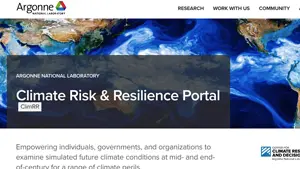 The Climate Risk & Resilience Portal from Argonne National Laboratory empowers individuals, governments, and organizations to examine simulated future climate conditions at mid- and end-of-century for a range of climate perils.
The Climate Risk & Resilience Portal from Argonne National Laboratory empowers individuals, governments, and organizations to examine simulated future climate conditions at mid- and end-of-century for a range of climate perils.
The goals of ClimRR are to:
- Provide free and equitable access to leading, peer-reviewed climate datasets to support analysis and data-driven planning for future climate risks.
- Empower non-technical individuals, organizations, planners and decision-makers at state, local, tribal, and territorial governments to gain awareness of future climate conditions and to conduct climate risk-informed analyses to support decision-making and adaptation efforts.
- Enable technical audiences to access to data and apply results to examine infrastructure design criteria, development plans, and other technical analyses that would benefit from the use of robust data for future climate conditions.
- Contextualize how climate risks factor into equity considerations and barriers to community and infrastructure disaster resilience.
- Provide near-nationwide assessments of the variables affecting future climate conditions and their potential impacts.
Click here to view the resource.




